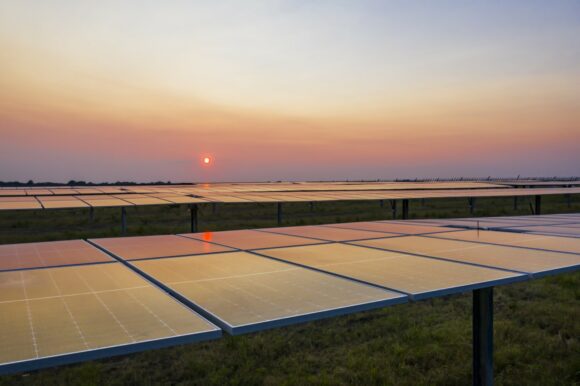HR 1 Undermines U.S. National Security and Traditional Republican Energy Policy
By George L. Strobel II
In an age defined by technological competition, particularly in artificial intelligence (AI), the United States cannot afford to neglect the foundational pillars of national power: energy security and military dominance. Yet House Resolution 1 (HR 1), as currently under consideration in Congress, threatens to do just that. By significantly undercutting the nation’s ability to meet surging energy demands, HR 1 not only jeopardizes America’s global leadership in AI but also runs counter to decades of core Republican values rooted in national defense and energy independence.
Core Republican Principles: Defense First, but Necessarily Supported by Energy Independence
For generations, the primacy of national defense has been a bedrock Republican principle. America’s emergence and continuation as the world’s superpower have been based on military and industrial might . . . made possible by the energy necessary to drive this superiority. Without abundant energy supply, America would not have been able to rally the manufacturing required to put ships, planes, tanks, and armament forward in the World Wars. The Great White Fleet, U.S. troop action in Europe and the Pacific, the nuclear Navy, forward presence, victory in the Cold War, international stability and keeping regional conflicts in check . . . all made possible by our energy dominance. As America finds itself locked in a high-stakes competition with China—and increasingly with other actors—for AI supremacy, the need for secure and scalable energy has never been more urgent.
According to Elon Musk in a recent interview with David Faber of CNBC (May 21, 2025), three pillars are essential for AI dominance:
- Chips – led by U.S. firms like Nvidia.
- Transformers – essential for converting raw electricity into usable power (for all energy sources).
- Energy – the lifeblood of data centers and machine learning infrastructure.
While the U.S. currently leads in chips, energy generation is emerging as the critical bottleneck.
A Legacy of Republican Support for All-of-the-Above Energy
The Republican Party has historically advocated for an “all-of-the-above” energy strategy—promoting oil, gas, nuclear, and renewables alike to ensure U.S. energy dominance.
- The Energy Policy Act of 2005, enacted under President George W. Bush with Republican control of both chambers, launched the original Investment Tax Credit (ITC) for solar—a landmark step that catalyzed American renewable innovation.
- That support has been bipartisan and continuous, with extensions under multiple administrations, including President Trump’s extension of tax credits for renewable energy in 2018 and 2020.
These policies were never about partisanship; they were about practical national strength, economic resilience, and energy independence. In fact, the Energy Policy Act’s key objectives included: Increasing Energy Production, Promoting Energy Efficiency, Modernizing the Grid, and Supporting Renewable Energy. Removing key support for renewable energy as HR 1 does in its current form structurally impacts each of these four tenants.
Surging Demand, Shrinking Supply
The challenge ahead is stark. According to ICF International, a major U.S. consultancy, electricity demand is expected to rise by 25% by 2030 and by 78% by 2050—driven by AI, cloud computing, EVs, advanced manufacturing, and crypto-mining.
As Elon Musk warned in the previously mentioned CNBC interview, the next chokepoint is not chips, but electricity generation. Musk’s company, xAI, is building a gigawatt-scale data center—equivalent to a nuclear power plant’s output—just to meet internal AI compute needs.
Musk predicts that “power generation challenges will arise by mid-to-late next year [2026],” and he’s far from alone in that concern.
HR 1 Would Devastate Planned Energy Projects
Despite this, HR 1 would cut deeply into the heart of America’s future energy supply and its ability to meet the forecasted increase in energy demand..
Analysis by David Riester and Paul Hildebrand of Segue Sustainable Infrastructure estimates that if HR 1 was enacted:
- 48% of planned renewable energy projects (solar, battery, wind) through 2033 would be canceled.
- 245 GW of planned capacity—$371 billion in investment—would disappear.
- These projects account for two-thirds of new grid capacity through 2033, meaning HR 1 would set back U.S. energy expansion by a full two-thirds.
This is not a marginal reduction—it’s a catastrophic contraction at a time when energy needs are exploding. Even more, it is elimination of ongoing technological advancement, manufacturing renaissance, and energy export opportunities.
Natural Gas and Nuclear Cannot Fill the Gap
While some might hope natural gas could offset these losses, Riester and Hildebrand’s analysis (which is consistent with other reviews) is sobering:
- New gas plants take 5–10 years to develop and construct.
- Equipment backlogs, especially gas turbines have 4–5-year lead times, making quick buildouts impossible.
- Even if constructed, gas-generated power would cost 25–30% more than solar/wind/storage alternatives.
Nuclear energy, while essential and rightly supported by President Trump’s latest executive orders, requires at least 8 years or more to bring new plants online. Moreover, the political stability of that support across administrations remains uncertain, as does public acceptance of safety and siting.
A Threat to National Security and AI Leadership
This is more than an energy debate—it’s a matter of national security.
- Artificial Intelligence leadership depends on scalable, reliable power.
- China is rapidly outpacing the U.S. in energy infrastructure, both in solar and nuclear. Beijing’s massive state-backed power grid expansion is designed specifically to support AI and military technologies.
- In a potentially concerning development, President Trump recently announced approval for Persian Gulf nations to purchase Nvidia’s most advanced AI chips—a region already overflowing with energy. This shift risks empowering states whose interests may not always align with the U.S., and particularly providing them the opportunity for additional development and technology innovation.
If HR 1 passes, the U.S. would be capping not only its own energy growth, but its leadership, just as the world enters an era where energy is THE deciding factor in technological and military supremacy.
Conclusion: HR 1 is a Strategic Energy Policy Mistake
HR 1 undermines the Republican Party’s Energy Policy principles, and particularly its longstanding commitment to:
- Energy independence.
- National security.
- Unleashing innovation through competitive infrastructure.
Reducing our energy capacity when demand is poised to skyrocket—especially from transformative technologies like AI—puts the U.S. economy, security, and global standing at risk.
The path forward must be clear, and boldly supported: America needs a recommitment to: “all-of-the-above” energy policy, an aggressive expansion of our power infrastructure, and rejection of legislation like HR 1 that weakens America’s future. In this new era of energy-driven competition, to falter is to fall behind, and to fall behind is to surrender.
Related Posts

Fast Company: Trump is coming for renewable energy—but the solar industry isn’t worried
Mar 24, 2025
By Kristin Toussaint Solar industry experts say it has too much Republican support, and makes so much sense economically, that the solar industry will keep growing. President Donald Trump has been […]

Novogradac Article: State-Level Renewable Energy Tax Credit Programs Provide Valuable Subsidy to Renewable Energy Development
Jan 20, 2026
by Mark O’Meara Renewable energy developers have access to a variety of incentives, from the Internal Revenue Code (IRC) Section 48E (technology-neutral) clean electricity investment tax credit to the IRC […]

Monarch Private Capital and Invenergy Close Nearly $170 Million Tax Equity Financing for Samson Solar Energy Center II
Sep 16, 2024
The 200-megawatt facility in Texas will be capable of powering more than 40,000 homes ATLANTA (GLOBE NEWSWIRE) – Monarch Private Capital (Monarch), a nationally recognized impact investment firm that develops, […]